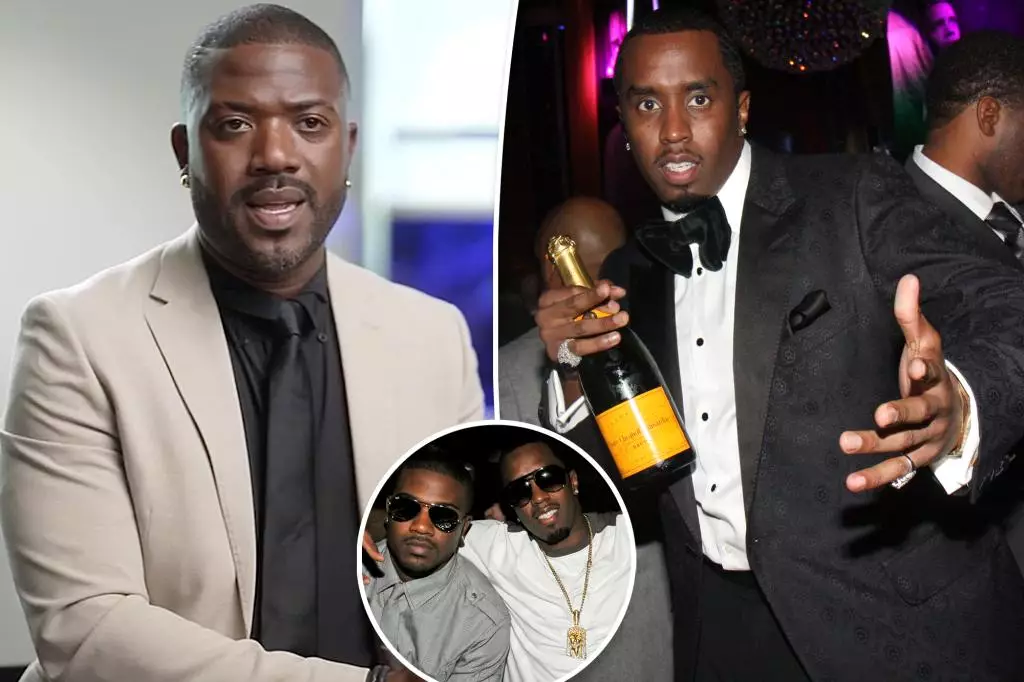The glitzy world of celebrity often masks an unsettling reality: behind the elaborate façade of fame and fortune, many secrets lie buried deep. In a recent candid interview with TMZ’s Harvey Levin, singer Ray J provided a glimpse into this hidden world, particularly regarding the legal woes of music mogul Sean “Diddy” Combs. Ray J’s comments have incited a wave of speculation, shedding light on how A-list celebrities may often navigate their careers under the weight of suppressed truths, financial incentives, and a culture that encourages silence.
Ray J suggested that a pattern exists in which individuals surrounding high-profile figures remain mute about questionable practices in order to protect themselves or their careers. He remarked, “People do catch and kill all day.” This phrase references an alleged practice where information detrimental to a celebrity is suppressed, usually for a price. In this context, the singer implied that individuals are often offered money to remain silent, thereby facilitating a cycle of victimization where the truth is obscured to safeguard the interests of powerful figures like Diddy.
In an age where social media amplifies voices and where many feel empowered to share their experiences, the irony of this dynamic cannot be overstated. Not only does this silence complicate the pursuit of justice for alleged victims, but it also raises ethical questions about complicity among those who choose not to speak out. Such economic and social incentives create an environment conducive to exploitation, where the fear of reprisal outweighs the perceived benefits of revealing hidden truths.
Ray J’s discussion with Levin also unearthed the reality that many celebrities struggle with sharing their stories due to the potential backlash they might face. When asked if high-profile figures were reaching out to him to share their experiences with Diddy, Ray J acknowledged that they feel he is a trusted confidant. This acknowledgment speaks volumes about the relationship dynamics within the entertainment industry, suggesting that some celebrities feel isolated, believing that speaking out could jeopardize their own positions or careers.
“It’s complicated,” Ray J confessed, expressing reluctance to divulge more information, which he believed had already been too much. This ambivalence illustrates the delicate balance that public figures must navigate: the desire for transparency clashing with the instinct for self-preservation.
Diddy’s ongoing legal problems paint a disturbing picture of misconduct in the realm of entertainment. Facing serious accusations that include sex trafficking and racketeering, the music mogul’s reputation hangs in the balance. Notably, attorney Tony Buzbee has indicated that there are numerous accomplices involved, thrusting the conversation into the realm of systemic complicity within the industry.
The implications of such allegations reach far beyond individual figures. They challenge the very culture of celebrity and its associated privileges, calling into question how power dynamics play out in relationships behind closed doors. The commentary surrounding Diddy serves as a grim reminder that the glamorous life often depicted in media can hide dark realities, affecting not just those directly involved but also their associates and the broader spectrum of Hollywood.
As the story unfolds, Ray J’s insights offer a crucial perspective on the superficiality of celebrity status and the complexities underlying personal narratives of trauma and exploitation. The incident at a Halloween party, where Ray J reportedly clashed with Diddy’s sons, epitomizes the tensions that simmer beneath the surface of fame. It highlights the real-world consequences of unresolved issues coming to the forefront, where even familial ties can become strained in the wake of scandal.
Moreover, these developments urge a re-evaluation of how society perceives those who come forward with allegations against powerful figures. They remind us of the courage required to advocate for justice in an environment where the stakes are exceptionally high and the repercussions can be devastating.
As we digest Ray J’s revelations and the ongoing saga surrounding Diddy, it becomes increasingly clear that accountability must extend beyond individuals, necessitating a cultural shift within the entertainment industry. The revelations challenge not only the celebrities involved but also the public’s understanding of celebrity culture as a whole. By promoting an environment where truth can eclipse silence, perhaps those with stories to share will feel empowered to speak out, thereby dismantling the structures that enable exploitation to flourish in the shadows of stardom.

